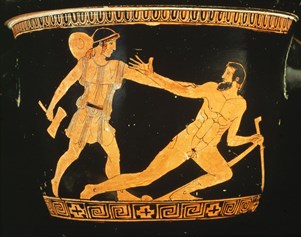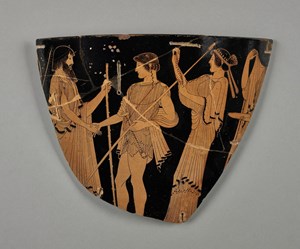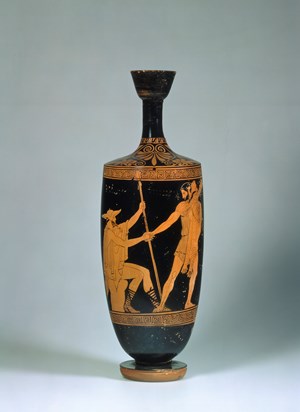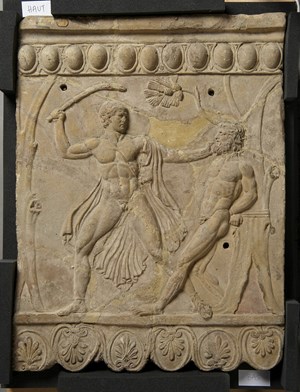Theseus was the mythical king and founder-hero of Athens. He was the son of Aegeus, King of Athens, or Poseidon, the sea god. He was raised by his mother, Aethra, in Troezen, but when he discovered his connection to Aegeus, he decided to travel overland to Athens and claim his birthright. Along the way, he performed numerous labours against chthonic enemies that took the form of murderous bandits. Many of these labours reveal a connection between Theseus, Eleusis, and the Eleusinian Mysteries. For example, at a place north of the Isthmus in Corinth, he killed the infamous Crommyonian Sow, an enormous wild pig raised by a woman called Phaea, ravaging the countryside. Pigs were the standard offering of the prospective initiates at the Eleusinian Mysteries, an animal used to purify the mystai and as a gift for the two goddesses during the celebration of the Greater Mysteries. In the plain of Eleusis, Theseus encountered Procrustes, a murderous smith and bandit who forced passers-by to fit the size of an iron bed, either by stretching them or cutting off their legs. The legendary hero cut off Procrustes’ feet before removing his head with his axe. In Eleusis, Theseus addressed the problem of Cercyon, the local king who enjoyed killing his visitors in brutal wrestling matches. Theseus managed to beat Cercyon and kill him by lifting him and dashing him to the ground. The goddess Demeter was said to have been present when Cercyon met his end.

Theseus and Procrustes, ca. 470 BCE, vessel, Kunsthistorisches Museum ©KHM-Museumsverband

Theseus received by Aegeus [a], Brygos Painter, 475-470 BCE, vessel, Musée du Louvre © 2017 RMN-Grand Palais (musée du Louvre) / Stéphane Maréchalle
In addition to his bravery, Theseus was famous for his love affairs. At the age of fifty, he joined with his friend Pirithous to abduct two daughters of Zeus. First, they kidnapped Helen, who was too young to marry. Therefore, they entrusted her to Theseus's mother, Aethra. Pirithous, though, had set his eyes on an even grander match. He persuaded his friend to follow him to the Underworld, where they would attempt to abduct Persephone, daughter of Zeus and wife of Hades. According to mythological tradition, Theseus had been initiated to the Mysteries and was, therefore, able to navigate the underworld with safety. Or so he thought. The two mortals managed to reach the abode of Hades, but before they could execute their daring plan, the god of the dead trapped them in chairs of oblivion (“lethe”) that chained them with invisible bonds to the underworld. Theseus remained immovable for many months and mourned his fate until Heracles came to his rescue. Heracles was on his way to capture Cerberus, the three-headed dog that was the guardian of the gates of the Underworld. He came across Theseus and Pirithous and attempted to release them. He managed to pull Theseus from his chair, but he could not do the same with Pirithous, who remained in the Underworld forever.

Lekythos depicting Theseus and Herakles in Hades, The Alcimachus Painter, 470-460 BCE, vessel, Berlin State Museums (SMB) © Staatliche Museen zu Berlin, Antikensammlung / CC BY-SA 4.0

Theseus and Sinis, 50 BCE-50 CE, sculpture, Musée du Louvre © 2009 Musée du Louvre / Anne Chauvet








